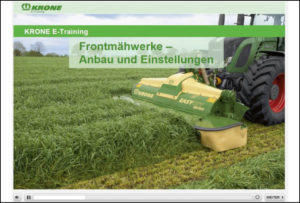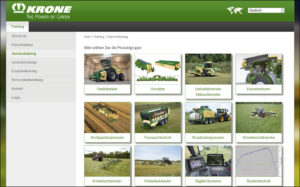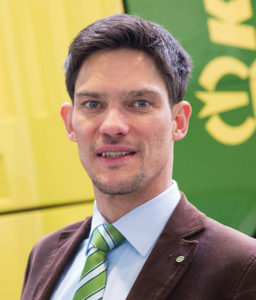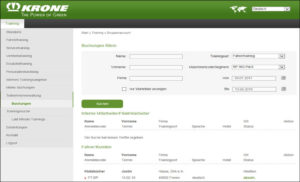The engineering factory Bernard Krone GmbH & Co KG is one of the leading manufacturers and system providers in the field of green fodder harvesting. KRONE technology is in use in over 60 countries around the world. From mowers to round and square balers to self-propelled forage harvesters, the product range currently comprises over 200 models. The export share is about 70 %.

A major challenge for the company’s training center, headquartered in Spelle in the Emsland region of Germany now consists of conveying the increasingly complex technology to national and international service and sales partners, subsidiaries, importers and end customers in an understandable manner through a targeted training programme. In addition, in-house customer service and internal staff from production-related areas are also part of the target group of the technical training and sales-oriented training courses offered. The focus here is increasingly on reducing travel costs. In addition, the fact that machines are becoming rapidly more complex leads to a growing need of training. And this need must in turn be matched with the time available to the participants (seasonal conditions). The KRONE training concept therefore consists of a mix of face-to-face training and e-training (WBT).
TCmanager LMS

Already since 2012, we have been using the TCmanager® from SoftDecc in Munich as LMS for the administration of our trainings. In the external presentation we work with the KRONE training portal, which is available to everyone on the web via the homepage and forms the interface to TCmanager. During the development of the training portal, together with SoftDeCC, we closely followed the layout and functionality of the homepage and designed the site according to the KRONE CI. Our entire range of training courses is clearly displayed in catalogue structures on the web from the TCmanager. It does not matter whether it is a face-to-face training or e-training. Using a tile interface, we ensure operability with mobile end devices such as tablets. Through a personalized login, we offer the user various functions in the portal.
Target group-optimized training offer
We can also vary the training offer according to the person logged in. This gives us the opportunity, for example, to offer internal employees additional catalogues that contain only internal training offering. Topics here are e.g. internal safety instructions.
The authorization structure distinguishes between course coordinators, course participants, and area representatives. The training coordinators have the most extensive authorizations. These persons can be internal (e.g. department heads) or external (e.g. workshop managers or sales staff of our service and sales partners). They are responsible for creating new persons and companies (for example, end customer companies, stores) in the system. Furthermore, they can view the training histories of their participants, evaluate them clearly, view dates and free training places and make bookings for the group of people under their administration. A comprehensive training search with corresponding filter criteria makes it easier for the training coordinator to find the right training. All correspondence via the system (e.g. automatically generated confirmation e-mails) is initially sent via them. Furthermore, these training coordinators can set up access (participant login) to the training portal for their participants. All you need is a personalized e-mail address. After receiving a confirmation e-mail with initial password, the participant has access to his own training history and the training courses booked for him, up to the hotel reservation made for him during face-to-face training. E-trainings booked for the participant can be started from the overview after login.
Simple determination of requirements
Via this participant login it is also possible to transmit training requirements via an “I am interested in” – function to the training coordinator. On the one hand, this function enables us to easily determine the requirements for the training coordinator. On the other hand, we solve the problem that our training offer is not sufficiently known to the participant. In the past we often learned from participants that the next step (e.g. after attending a basic training course) is not clear to them. This was due to the unknown training offer. Thus, it was clear to us that every registered training participant would anytime and anywhere have the opportunity to determine his or her own educational path and to close knowledge gaps.
Area management

In addition to the above-mentioned participant login functionalities, area representatives also have access to bookings for a corresponding group of people from their area. In this connection, the assignment of the training coordinator’s company to the relevant area representative plays a decisive role. If the training coordinator adds persons to his or her administration, he or she automatically enters the parameter of the area representative in charge. This gives them the opportunity to inform themselves about training participations of individual service and sales partners and customers from their area at any time.
In general, we do not distinguish between face-to-face training and e-training in these presentations. For the latter, the status of the course can also be viewed. This means that if the course is already in progress, it has not yet been started by the participant, or has already been worked through and passed by the participant. We implement this feedback via the SCORM interface between our authoring tool and the LMS TCmanager.
Against the background of the new EU data protection directive, the issue of data protection has top priority for us. Thus, the participant is fully and comprehensibly informed about the use of his data the first time he logs in. Confirmation and consent is a prerequisite for further use of the functions in the login area and can be revoked at any time.
Sustainable system landscape
For the creation of e-trainings, we use Storyline III from Articulate. To a large extent, we create the learning units within the department or in close cooperation with other departments, such as marketing (images and film material, animations) and design & development. If necessary, we get support from a service provider who works together with us on projects and also provides didactic input.
Then again, we use an interface to our SAP system for the calculation of our trainings. By transferring certain data from TCmanager, we can ensure and track the correct invoice flow. This way, we make use of up-to-date accounting-relevant data from SAP and supplement it with the necessary data on our part. The invoice recipient is generally the organization of the respective training coordinator, who then initiates further invoicing if necessary. Thereby, we work in the same way as the sales channels of other departments within our company.
 Interview with Jan Henrik Holk,
Interview with Jan Henrik Holk,
Head of Training Center at the engineering factory Bernard Krone GmbH & Co KG
eLearning Journal: Are external target groups considered in the conception and production of learning units? So similar contents are prepared in different ways, for example, do outsiders get mainly mobile formats…? How does your training center deal with the additional work if necessary?
Jan H. Holk: Yes, in principle we orient our training units not only in terms of content but also, in the selection of the medium, according to the target group. As an example, we have combined our entire product range of mowers, rotary tedders and windrowers in the area of service training (target group here is the workshop personnel of our service and sales partners) into one training unit. This is carried out as a 3-day face-to-face training at various training locations. For our end customers, on the other hand, we offer content from this training unit as e-training tailored to the product and content of the target group. The background is as follows: As our service and sales partners usually deal with the complete product range, a 3-day training participation is interesting for this group of participants and travel routes to one of our training locations are more likely to be accepted.
This training also contains important practical units that are indispensable for this target group. Our end customers, on the other hand, are only interested in a special product, even a model, from the entire range. In terms of time, the training could thus be reduced to a fraction. In addition, the content is not as detailed here. For this reason, the acceptance of attendance at a face-to-face training is very low. We are therefore increasingly supplementing our training offers with e-learning units where it makes sense. This is why we always focus on the feasibility of the content and the target group.
eLearning Journal: What were the key criteria for selecting your Extended Enterprise LMS?
Jan H. Holk: For us, an “Extended Enterprise LMS” goes hand in hand with the possibility of external participant management. Training coordinators of our service and sales partners have the possibility to supplement their participant base via the training portal and to set up accesses for persons from their organization or end customers. This is done without any additional effort of the administrators in the training center. Behind all this is a not inconsiderable authorization structure on the part of LMS. The decisive factor for us was that the LMS, naturally in conjunction with the “customized” web portal, provides this functionality.
When selecting the LMS, we also focused on future expansion options with regard to market-specific country portals.
The connection or creation of a new web portal now takes place almost exclusively within the department. The TCmanager offers the suitable solution through a portal function. In addition to points such as SCORM compatibility, user-friendliness, etc., the price-performance ratio also plays a decisive role. With TCmanager, we have found a solution that meets our requirements of our specification sheet as far as possible in standard.
Last but not least, the people behind a product are involved in further developments, customer-specific adaptations and support. The team of SoftDecc GmbH always has an open ear for our requests, advises us on possible implementation strategies and is always available in the service department.
eLearning Journal: Does the Extended Enterprise concept also offer learning media liable for costs (e.g. to at least partially refinance production costs or for customer retention)? If so, what effects will this have on the production of the learning units on the one hand and on the catalogue on the other?
Jan H. Holk: We can set a price for both face-to-face and e-learning sessions, depending on the course module. This is displayed in the training portal via the catalogue and communicated accordingly during the booking process. In addition, we can define price groups by categorizing participants in TCmanager. A very simple example is the distinction between internal and external participants. In my opinion, however, it is extremely important to keep an eye on the target group and the benefits for a company, especially when pricing the e-training units. In the end, it is of little help if we can only register a few training participations due to a deterrent price and later have to struggle with insufficient product knowledge of our service and sales partners or end customers.
eLearning Journal: What do you see as the next big challenge for your training center?
Jan H. Holk: We see an increasing tendency in our industry towards digital learning. In other sectors, this trend may already have continued, which, among other things, can be explained by the respective content and target groups.
For us, the focus is therefore currently on the expansion of capacities in the area of content creation. The existing system world on the part of LMS enables us to enter the mass market on an ever-broader international scale. However, we see a great challenge in the acceptance of our e-training offer. It is our policy to complement the range of face-to-face training with e-learning units, exactly where it makes sense.
Attractive design and consideration of didactic principles are intended to arouse increasing interest. The booking process must remain simple and clear.
Furthermore, we have the integration of VR and AR technologies into our training concept on the screen. All measures and projects, however, from the point of view: How do we get information in the right format, exactly when it is needed, to the right person.
We see it as one of our core tasks, as the “headquarters” of the training, to not only make the training itself, but also the system worlds available to other markets. The objective is to provide regional training as well as market-specific training and to make our subsidiaries and partners in each country more independent in terms of training. All this against the background of a CI and a uniform and consistent concept. Important core markets are already working with TCmanager. For example, our subsidiaries in the UK and France.

Using the portal function of TCmanager, new web portals can be created as country-specific training portals. Colleagues from the training department in France publish their specific training offer via their portal, colleagues from UK similarly, etc. However, all participant data converge centrally in TCmanager. Thus, a participant from the UK can start his education locally and continue it with the qualifications obtained there without any problems, e.g. in Germany. We thus promote the possibility of offering training to a certain level in the respective markets. This relieves the training center in Spelle on the one hand and reduces the travel costs mentioned above on the other. The potential of e-training can also be better exploited through brand-specific adjustments.
Conclusion
In summary, it can be said that our customers as well as our service partners and sales partners are becoming justifiably more demanding and the demands on us in terms of training and targeted provision of information are constantly growing. It is no longer enough to provide the customer with an operating manual, however comprehensive. Rather, the expectation is to receive practical instruction directly on the machine or in a special function thereof, anywhere in the world, exactly when the customer wants it. A challenge that cannot be met without digitizing the learning worlds. With regard to consistency and transparency of data, not only for legal reasons, but a task that must be approached with consideration.
In summary, it can be said that our customers as well as service and sales partners justifiably become more demanding and the requirements to us in terms of training offers and target-oriented the provision of information. It is no longer enough to provide the customer with an operating manual, however comprehensive. Rather, the expectation is to receive practical instruction directly on the machine or in a special function thereof, anywhere in the world, exactly when the customer wishes it. A challenge that can be met without digitizing the learning worlds cannot be realized. With regard to consistency and transparency of data, not only for legal reasons, but a task that must be approached with consideration.
The Author
 Jan Henrik Holk
Jan Henrik Holk
After graduating from high school in 1998, he first completed agricultural training on a wage farm. In the summer of 2000, his enthusiasm for agricultural engineering was the reason why he began studying mechanical engineering at the University of Applied Sciences in Cologne, specialising in agricultural machinery. Through various internships during his studies and his diploma thesis in 2004, he gained valuable experience in several companies in the industry. Customer proximity and international after-sales activities were the main reasons for joining KRONE at the beginning of 2005 as a service engineer in international customer service. Parallel to the service activities, the area of technical training was established and continuously expanded. A milestone was the construction of the new KRONE training center in Spelle in the years 2012 and 2013. This is what made it possible to create future-oriented capacities in terms of space and personnel.
Contact:
Contact person:
Jan H. Holk
Training Center Manager
Heinrich-Krone-Straße 10
48480 Spelle
Phone: +49 (0) 5977 / 9 35-481
www.landmaschinen.krone.de





